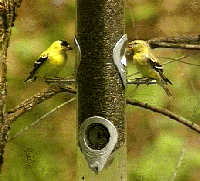New Extension Video Covers Bird Feeding Basics
New Extension Video Covers Bird Feeding Basics

Veteran bird watchers and novices alike will get some useful, money saving tips on seed and feeders from a new video called "Feeding Birds in Your Backyard" that was recently produced by the Kentucky Cooperative Extension Service.
Americans love their feathered friends. Nearly 54 million people in the United States annually shell out almost three billion dollars for bird seed and another eight hundred million dollars for feeder equipment.
The 15-minute video covers all the essential topics involved in this national pastime. The program's main theme is that the type of feed and the size, shape and location of your feeder will determine the kinds of birds that you are likely to attract.
"For instance, the small black oil-type sunflower seeds are preferred by most species and give the bird lover the most product for the dollar," said Thomas Barnes, Extension wildlife specialist in the UK College of Agriculture who wrote the video script.
There are a variety of other feed options that attract more specific birds. White millet will bring in mourning doves, dark-eyed Juncos and white throated sparrows. Suet appeals to wrens, titmice and chickadees. Niger seed attracts American goldfinches.
> The video discusses the various approaches to attracting and feeding humming birds. These tiny, brightly colored aerial acrobats need special feeders that mimic the flowers that are their primary source of food.
Many people who put up a bird feeders also end up feeding furry neighbors such as squirrels and chipmunks. "They can cause frequent, persistent problems by monopolizing the feed supplies, frightening the birds and damaging the feeders," said Barnes. "Grey squirrels are arcuable the number one pest because of their enormous appetites."
Squirrel controls can take the form of an alternative feed sources such specialized corn cob holders and swings and that can make the feeding process practical and entertaining.
"The new bird feeding video will be available in many Kentucky county Cooperative Extension offices, but individuals desiring their own VHS copy can order it from the University of Kentucky College of Agriculture" said Jeff Franklin, the program's producer and a member of the Ag Communications Services Electronic Media and News section.
The program costs $20. Checks should be made out to the "University of Kentucky" and orders can be sent in care of the Instructional Video Library, 131 Scovell Hall, University of Kentucky, Lexington (40546-0064).